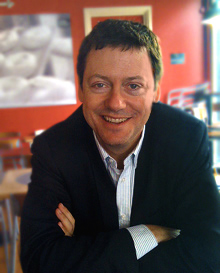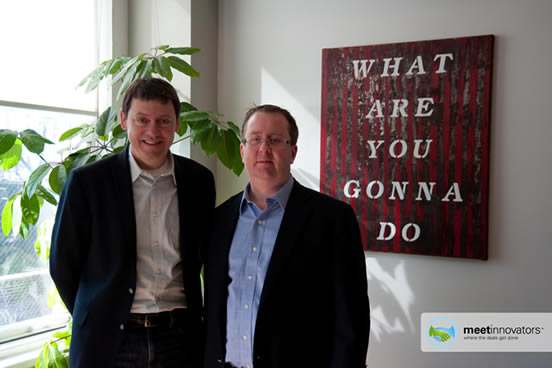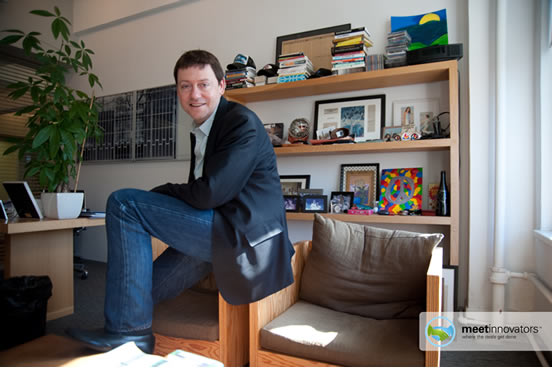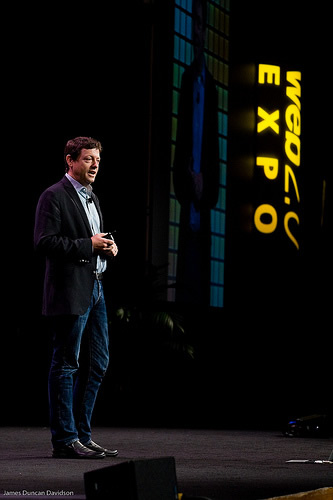
- Find Out How To Raise Money From Fred’s VC Firm
- Learn About The Investor Who May Be Becoming The #1 VC In The World
- Listen To Fred’s Opinions On The Startup Scene In The NYC Area
Full Interview Audio and Transcript
Personal Info
Hobbies and Interests: Live music, theatre, golfing, skiing, biking, and blogging.
Sports teams: New York Jets, New Jersey Nets, New York Knicks.
Favourite Books:
- The Amazing Adventures of Kavalier & Clay by Michael Chabon
- Atlas Shrugged by Ayn Rand
- The Prince by Niccolo Machiavelli
Favourite Entrepreneurs: Doesn’t play favourites; would consider it to be like picking favourite children.
Twitter url: http://twitter.com/fredwilson
Personal blog: http://www.avc.com
Company website: http://unionsquareventures.com
Fast Track Interview
Adrian Bye: I’m in the offices of Fred Wilson of Union Square Ventures in New York City. It’s a pretty interesting office space that’s a little bit like a kid’s playroom. It feels very creative. Fred, can you tell us a little bit about who you are and what you do.
 Fred Wilson: I have been a venture capitalist, which means I invest in startup companies, for 23 years. This is the third venture capital firm I’ve worked with and the second one I’ve started. We invest in web services companies, which is any business that is built from the ground up to exist pretty much only on the web. In addition to this, I write a pretty well-read blog at AVC.com. I’ve been writing that every day since 2003. I’m also a fan of new technologies and constantly interested in what the next big thing is.
Fred Wilson: I have been a venture capitalist, which means I invest in startup companies, for 23 years. This is the third venture capital firm I’ve worked with and the second one I’ve started. We invest in web services companies, which is any business that is built from the ground up to exist pretty much only on the web. In addition to this, I write a pretty well-read blog at AVC.com. I’ve been writing that every day since 2003. I’m also a fan of new technologies and constantly interested in what the next big thing is.
Adrian Bye: I’m an avid reader of your blog, AVC.com. You must have had attraction right away since you were already a brand in the New York City community, correct?
Fred Wilson: I think what appeals to readers of my blog is that I am a venture capitalist. A lot of entrepreneurs want to be successful in raising money from venture capitalists. Being able to read the blog of somebody who’s on the other side of the table has always been a great value proposition for the entrepreneur.
I was fortunate that there was a built-up native audience for my blog from day one. I tell people, "If you show up every day, and there’s a new post on the blog every single day, you will create a habitual readership that will come every day and see what the latest thing that you’re writing about is."
It doesn’t take that long to read one blog post. You can do it in 30 seconds or a minute, so it’s not a whole lot of time commitment for people. People then build that habitual readership. If you keep feeding it, then you’ve got something.
Adrian Bye: I’m interested in the New York City Tech Scene, which you are a part of.
Fred Wilson: When people come to New York and say, "I want to connect into the Tech Scene," the first thing I tell them is to go to the Tech Meetup. The second thing I tell them is to join Next New York, which is a group of entrepreneurs and people who work in startup companies. They have more regular meet-ups and subgroups within it. It’s very active. They play sports together. There are hack-a-thons where people get together and hack Facebook apps, iPhone apps, Android apps, or Twitter apps. There are also meet-ups around different areas in cloud computing or hacking education. Here in New York, a lot of different things are available for people’s interests.
It’s a pretty vibrant community here in New York. It’s not the same as what you have in San Francisco. The startup culture and the startup community in the San Francisco Bay Area and all the way down to the peninsula is probably five to 10 times the size of the New York community.
There’re a couple of other differences. In Silicon Valley, the peninsula itself is the suburbs. In a suburban lifestyle, it’s family-driven and not as hyperactive as the urban lifestyle. Here in New York, you have a fairly dense population, and people are bumping into each other on the street all the time. It’s a little bit more of going in the coffee shops, restaurants and bars here.
 In Silicon Valley, it permeates the entire culture. For example in Silicon Valley, when you go to your kid’s soccer game on the weekends, three VCs and 10 entrepreneurs are on the sidelines cheering on their kids. That doesn’t happen here in New York. I went to my son’s soccer game recently. Nobody at that soccer game was in the technology industry.
In Silicon Valley, it permeates the entire culture. For example in Silicon Valley, when you go to your kid’s soccer game on the weekends, three VCs and 10 entrepreneurs are on the sidelines cheering on their kids. That doesn’t happen here in New York. I went to my son’s soccer game recently. Nobody at that soccer game was in the technology industry.
On the other hand, a really vibrant culture exists here. At the coffee shop I go to many mornings, two other VCs and probably 10 entrepreneurs were having breakfast there recently. It’s a little different in the way that the communities work, but there’s a really important and critical mass of entrepreneurs working in New York now.
Adrian Bye: Why do you stay here in New York? You’re an ambitious guy. Why don’t you move to Silicon Valley? Are you sacrificing by living in New York?
Fred Wilson: I don’t feel like I’m sacrificing by living in New York. I’ve lived here the past 26 years of my life. My family’s here. I’ve been able to be part of two pretty influential venture capital firms. We have backed many interesting companies on the web. It’s true that I haven’t been able to invest in a bunch of great companies that have gotten built in the Bay Area, but I don’t feel like that has cost me hugely. All things being equal, I prefer to do it the way I’m doing it.
Adrian Bye: My feeling is that the influence you’re getting with your blog and the investments you seem to be getting are all over the country now. Maybe it’s even mattering less because of the strength of the internet and the brand that you’re starting to build. Would you agree with that?
Fred Wilson: Yes. We can win deals in the Bay Area. My partner, Albert, and I were talking about a deal recently that’s based in the Bay Area. They have multiple-term sheets and the entrepreneur told us that they’d rather have us. Now there are some great venture capital firms in the Bay Area and we do get beat by them so I’m not saying that we’re the best venture capital firm in the country.
My point is that we can be competitive anywhere in the country as a venture capital firm. Some of that is due to the blog. Some of that is due to the portfolio we’ve built. We have invested in a lot of really interesting companies, and when entrepreneurs look at that list of portfolio companies I think they say, "These guys are smart. They understand this business. They’ve picked a lot of winners. I’d like to work with them." We have that now. I think that makes us a top tier venture capital firm.
Adrian Bye: In the New York scene when I was asking some guys about you, their eyes were lighting up when they were talking about Fred Wilson. You’re an important guy in the local community for them. One of the comments that came up was your leadership and the things you’ve driven here. They wanted to know what more you think should be done to help the local community grow.
Fred Wilson: We have to create some big companies. The biggest problem we have in New York is there hasn’t been a Google, a Facebook, a Netscape, an Amazon or an eBay-scale company that has come out of New York. The closest is DoubleClick, which Google bought for $3 billion.
If you look at the internet, it’s like an operating system. An operating system ships with hundreds, maybe thousands of features and functions in the system. For example, the search function in the internet operating system is Google; the auction function is eBay; the payment function is PayPal, and the e-commerce function is Amazon. The ad server function is DoubleClick.
 With DoubleClick, we have had a company that has reached internet scale and touches hundreds of millions of users every day, and that’s great. But we haven’t built a consumer-facing internet brand here in New York of that kind of scale. That’s what we have to figure out how to do. We do have a few companies in our portfolio that have a chance of doing that, and we want to try to make that happen.
With DoubleClick, we have had a company that has reached internet scale and touches hundreds of millions of users every day, and that’s great. But we haven’t built a consumer-facing internet brand here in New York of that kind of scale. That’s what we have to figure out how to do. We do have a few companies in our portfolio that have a chance of doing that, and we want to try to make that happen.
Adrian Bye: Why do you think it hasn’t happened yet? What’s New York missing?
Fred Wilson: Some of it is time. The startup scene in New York really didn’t get going until the late ‘90s, so we’re maybe a dozen years into it now. If you go back to Silicon Valley, which started in the ‘60s, they had a few companies of that scale by the early ‘80s. Silicon Valley has really hit its stride in the second and third decade where they’re knocking out three or four huge-scale companies a decade. New York is now into its second decade as a startup culture, and this is the decade we’ve got to start doing it.
The second part, which is related, is that we don’t have the role models here. Role models can be companies or entrepreneurs, but it takes a belief in yourself and the thing you’re working on that can withstand a lot of pressure to get a company that scale. Google could’ve been bought by Yahoo! or somebody else and if it weren’t for the fact that nobody was willing to pay them enough money, it would’ve been. But they stayed independent and built a huge-scale web service.
In New York, we, as a community of entrepreneurs and investors, have also been a little quick to take the first opportunity to get cashed out and not necessarily been patient and taken the 10-plus years that it takes to build an internet company.
Adrian Bye: Someone I was talking with recently made the point that New York is more of a transactional city and Silicon Valley is more about building a big vision.
Fred Wilson: Yes, I think that’s true, and I also think that is changing and will continue to change. This is a culture that’s dominated partially by Wall Street, which is a highly-transactional culture. Everybody likes getting a payday in this town. It’s an expensive place to live. Money matters. If you say, "I own 20 percent of Twitter," which let’s say is worth $1 billion, nobody cares. They don’t know why Twitter’s worth $1 billion or even if it is. I’m not suggesting that it is.
But if you say, "I manage a $1 billion hedge fund," they’d go, "Whoa, that’s amazing!" It’s a different kind of community, but it’s changing. People are starting to care a lot more about the entrepreneurs and the investors in technology companies here in New York.
Adrian Bye: The question a lot of people are going to have for you is how do you give them money?
Fred Wilson: The best advice I can give to people is to build a relationship with me and get me excited about what you’re doing before you ask me for money. That’s hard for people because they need money. I’d say to them, "Well, I want to get to know you. I want to be able to follow what you’re doing. I want to watch how you’re executing. I want to see you launch something. I want to see other people using what you’ve launched, and then I’ll give you money." That’s a lot of hurdles they have to jump over just to get me to write a check. A lot of people will say, "No thanks. I don’t want to go through a year or two-year long dating experience."
But a good example is Avner Ronen. He’s the CEO and Founder of Boxee. Avner came in here two years ago with the idea to create a piece of hardware that would go in your media center, connect your media center and your TV to the internet, and provide services on that. The software that ran inside the box was actually quite interesting to me, but I didn’t want to be in the hardware business. I said to him, "I don’t really like this hardware business model. There are probably some VCs out there who do, so you should go talk to somebody else."
 He stayed in touch, and about nine months later, he came back to me and said that they decided to get rid of the hardware and be an open source software company. That excited me, and I said, "You haven’t launched yet so why don’t you launch it." He launched it. About three months after that, he came back to me and said, "I have 100,000 who are using this." I installed it and started using it. Within the next few months, we were investors.
He stayed in touch, and about nine months later, he came back to me and said that they decided to get rid of the hardware and be an open source software company. That excited me, and I said, "You haven’t launched yet so why don’t you launch it." He launched it. About three months after that, he came back to me and said, "I have 100,000 who are using this." I installed it and started using it. Within the next few months, we were investors.
Avner took the time. He never got pissed off that I said, "No." It isn’t wrong getting pissed off. Every entrepreneur has every right to get pissed off when people don’t want to invest in their vision. Frankly when we were raising our fund back in 2003 and 2004, I used to take it personally when people would say "no" to us.
But to Avner’s credit, he was very positive. He managed to create a great relationship. He listened to some of the things I said that resonated with him, rejected many of things I said that didn’t, and built a really good relationship to the point where when we invested, I felt really good about being partners with him.
That’s the best way to try to get us to invest money. If you need money in the next month and come knocking on our door, it’s highly unlikely we’re going to invest. That’s just not how we are wired in this firm.
Adrian Bye: You have a finance background. How critical is it to have a strong finance background to be a VC?
Fred Wilson: I don’t think every VC needs to have that skill set. At least one of the general partners in the firm needs to be a finance-oriented mind, so the firm itself is always including the financial aspects of the transactions they’re doing in the decision-making process. I don’t think that the financial aspects of the decisions are necessarily as important as people and product, or people, product and market, but they’re critical nonetheless and need to be part of the investment process.
Adrian Bye: You made a blog post recently about how good VCs need to be well-connected connectors and do a lot of introductions. What are the other key elements of being a good VC?
Fred Wilson: Rolodex and sale skills. Before anything else in the venture business, you need to be able to reach the right people. You need to do that to source deals. You need to do that to win deals and you need to do that once you’ve made the investment to help the company succeed. To me, rolodex is the most important thing.
After that is salesmanship or the ability to convince an entrepreneur to take your money over someone else’s money. It’s also the ability to help the entrepreneur convince people to join their company, to convince other people to invest in their company, and to convince business partners to do business. Those are really the two most important skills of being a good VC.









